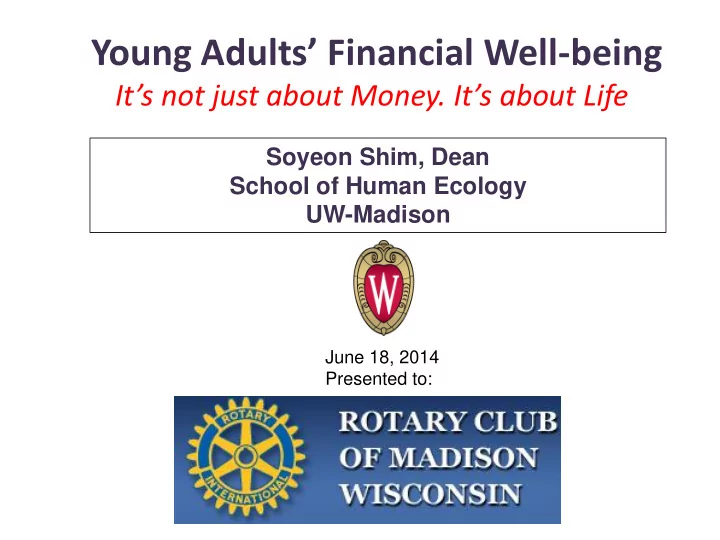

Young Adults’ Financial Well -being It’s not just about Money. It’s about Life Soyeon Shim, Dean School of Human Ecology UW-Madison June 18, 2014 Presented to:
Young Adults’ Financial Well -being It’s not just about Money. It’s about Life
Guiding Research Questions for APLUS • Why some were managing their finances well, while more and more of them were failing to do? • Why this was so and what distinguished the good managers from the bad?
? Early financial behaviors, attitudes, & knowledge that drive lifetime returns?
DEFINING GENERATIONS How I prefer to communicate with you Generation Age I prefer…. Millennials 25 Facebook/Tweet to me Y 30 Text me X 35 Send me an email Boomers 50 Call me on my cell Traditionalists 60 Let’s have a conversation
APLUS Project Recap 1 st Year 4 th Year 6 th Year Economic Wave 1 Crisis Wave 2 Wave 3 Data: Wave 1.5 Data: Data: 2008 2009 2010 2013 N=1,500+ N=1,100+ N=2000+
Final Report President’s Advisory Council – established by President’s Advisory Bush (2008) and Council on Financial continued by Obama Capability January 29. 2013
Selected Wave 1 Findings • In the transition to college: – Early financial socialization strengthens college students ’ financial behaviors. – Parental communication and expectations matter more than parental finances (e.g. SES).
Recession Harder on Men Than Women, Study Says Wednesday, March 11, 2009 The Recession Hits College Campuses It could be a “ turning point ” in how much it costs to attend college By Kim Clark Posted January 27, 2009 chicagotribune.com First jobs are hard to find for many college grads Last year's graduates were dreading U.S. job market, 2009 may be twice as bad. By Marcia Heroux Pounds and Scott Travis South Florida Sun-Sentinel
$350 Changes in Credit Card Debt Doubled $300 Tripled $250 +55% $200 -24% +60% $150 +64% $100 $50 $0 Overall White Black Native Hispanic Asian Wave 1 $95 $72 $81 $127 $147 $161 Wave 1.5 $152 $118 $258 $197 $302 $123
The Model of Happiness Lyubomirsky, Sheldon, & Schkade (2005). Pursuing happiness: The architecture of Sustainable change. Review of General Psychology , 9(2), 111-131.
Wave 1 Wave 1.5 9. Financial 3.Attitude Crisis (moderator) Current 4. Parental Financial 8. Actual 7. Norm Well-being Saving Behavioral Behaviors Intention 5. Perceived Control 6. Current Planning Sense of Horizon Overall Well- 2.Past being Financial Well- being 1. Past Sense of Control variables: Overall Well- Gender Ethnicity being Parental SES Perceived impact of economic crisis
Wave 2 Three years and one financial crisis later
Effects of Cumulative Financial Education 14% + 11% + 3% +
Wisconsin
Wave 2 - Emerging Financial Identity One’s understanding and expression of who one is in relation to managing and practicing personal finance
Emerging Financial Styles Pathfinder (31% ) Drifter (30% ) Follower (39%)
Financial Style and Capability 5 High 4 Followers 3 Pathfinders Drifters 2 1 Subjective Objective Financial Behavior Low Knowledge Knowledge Shim, Serido, & Tang (2013). Financial Identity-processing styles among young adults. Journal of Consumer Affairs
L Wave 3 Life After College: Drivers for Young Adult Success
Fig.1 Employment Status Two Years Out of College 7% 9% 9% 49% FTE = 49% 6% 20% PTE =20% FTE PTE/Self-Employed Unemployed Grad School/PTE Grad School/Not Working Late Launchers
How Self- Sufficient are Today’s (College Graduated) Young Adults ? Even 50% of Full- • 32% - Self-Sufficient Time Employed Adults relying on • 51% - Helped by Family some support from Members parents • 17% - Borrowing No or little SES Elsewhere differences
Fig. 18: Debt & Well-Being 4 3.5 3 Physical well- Psychological Life satisfaction Financial well- being well-being being No Debt Debt
Impact of Employment x Debt: on Overall Well-being No Debt Debt Full-Time No Job Full-Time No-Job Well- A B C D being? A > C >B >D
Fig. 24: Young Adult Financial Behavior Categories 12% 26% 61% High Functioning Rebounding Struggling
• The most progress toward adult self- High sufficiency Functioning • Highest career status • A head-start and a competitive advantage 12% Normative progress Rebounding Normative career status 61% Wake-up call &Trajectory rising Least progress Struggling Lowest career status 26% Transition to adulthood may be drawn out Competitive disadvantage – risk factor
HIGH FUNCTIONING Higher Parental Expectation More Financial Education More Positive Financial Attitude STRUGGLING Higher Perceived Control
What Can You Do?
Just-in-Time Financial Parenting (and grand- parenting)! • Be intentional in your interactions • Engage in adult dialogue about financial matters - “Why” not just “Facts” • Expect more…do less • Model positive financial behaviors, especially ongoing learning • Help them become a path finder and/or a follower (not a drifter)
What can we do at UW?
School of Human Ecology Center for Financial Security #1 SoHE Big Idea 21 st Century Citizen Initiative – Financial Capabilities for Life Success
UW Credit Union – UW-Madison Partnership for Financial Capability Initiative
Your are cordially invited to The School of Human Ecology for a Fellowship Lunch hosted by Majid Sarmadi & Soyeon Shim Wednesday, July 9 th , 2014 Thank you!
Recommend
More recommend